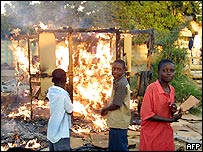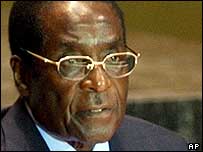Untitled Document
 |
People have been evicted and
their buildings destroyed |
Police say 30,000 people have been detained, while hundreds of homes and businesses
have been demolished, and many thousands are now homeless.
A coalition of opposition groups has called for people to stay at home on Thursday
and Friday.
Police have warned they will deal "ruthlessly" with any street protests.
The authorities said the security blitz was designed to clean-up Zimbabwe's
urban areas, and crack down on those involved in illegally trading foreign currency
and scarce foodstuffs like sugar.
The sweep has been heavily criticised by church groups and opposition parties,
which have combined to form a group called the Broad Alliance and call for the
strike.
Test of strength
Zimbabwe's main opposition group, the Movement for Democratic Change, threw
its weight behind the strike on Wednesday.
"We call on all the people to stay at home on Thursday and Friday this
week," it said.
"We call on all the people of Zimbabwe to organise themselves and protest
against the actions of this regime.
 |
Robert Mugabe is set to amend
the constitution |
"This criminal regime has destroyed and stolen the properties of people
who are trying to make an honest living through informal trading."
The strike coincides with the state opening of parliament on Thursday, during
which President Robert Mugabe is expected to announce constitutional changes
that could tighten his grip on power.
The UN has demanded that Mr Mugabe stop the eviction operation, which it describes
as a new form of "apartheid".
It has estimated that up to 200,000 people may have been made homeless by the
operation.
The BBC's southern Africa correspondent Barnaby Phillips says Zimbabwe is set
for another test of strength between an embattled opposition and a repressive
government.
The government has put on a show of force - with military helicopters clattering
overhead - leaving people in no doubt that those who do strike could face punishment,
he says.

